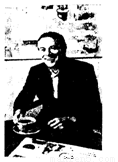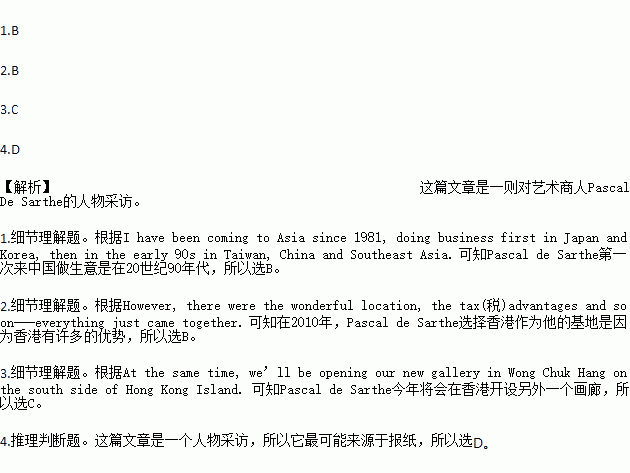题目内容
An Interview with Pascal De Sarthe

French-born Pascal de Sarthe was self-taught and becoming more and more famous among the art businessmen in the 1980s. He became one of the most recognized gallery managers of the 21st century. He made Hong Kong his base in 2010. Today, with one gallery here and another in Beijing, he’s clearly fallen in love with art.
By Philippe Dova
What made you decide to based in Asia?
I have been coming to Asia since 1981, doing business first in Japan and Korea, then in the early 90s in Taiwan, China and Southeast Asia. Half of my business was in Asia and I quickly started spending two weeks of every month in his area. I made many friends with new collectors who were interested in both Western and Eastern art. In 2010, staying in Asia and opening a gallery in Hong Kong seemed like the natural thing to do.
Why Hong Kong?
There was nothing to indicate that Hong Kong would become the center of the Asian art market. However, there were the wonderful location, the tax(税)advantages and so on---everything just came together.
Art Basel came to Hong Kong shortly after you did
There was already Art HK, but after careful research of the market. I believed it was reasonable for Art Basel to take over Art UK.
What will you be exhibiting at Art Basel this year?
We’ll be showing only postwar Asian artists and new-generation Beijing artists. At the same time, we’ll be opening our new gallery in Wong Chuk Hang on the south side of Hong Kong Island.
1.When did Pascal de Sarthe first come to China for business?
A. In 1981 B. In the 1990s
C. In 2010 D. In the 2010s
2.Why did Pascal de Sarthe make Hong Kong his base in 2010?
A. Hong Kong was the center of the Asian art market
B. There were many advantages in Hong Kong
C. Art Basel was better than Art HK
D. He had two galleries in China
3.What will Pascal de Sarthe do this year?
A. He will show interest in art exhibition
B. He will care more about Beijing artists
C. He will open another gallery in Hong Kong
D. He will move to the south of Hong Kong Island
4.Where is this passage probably form?
A. A novel B. A business report
C. A poster D. A newspaper

